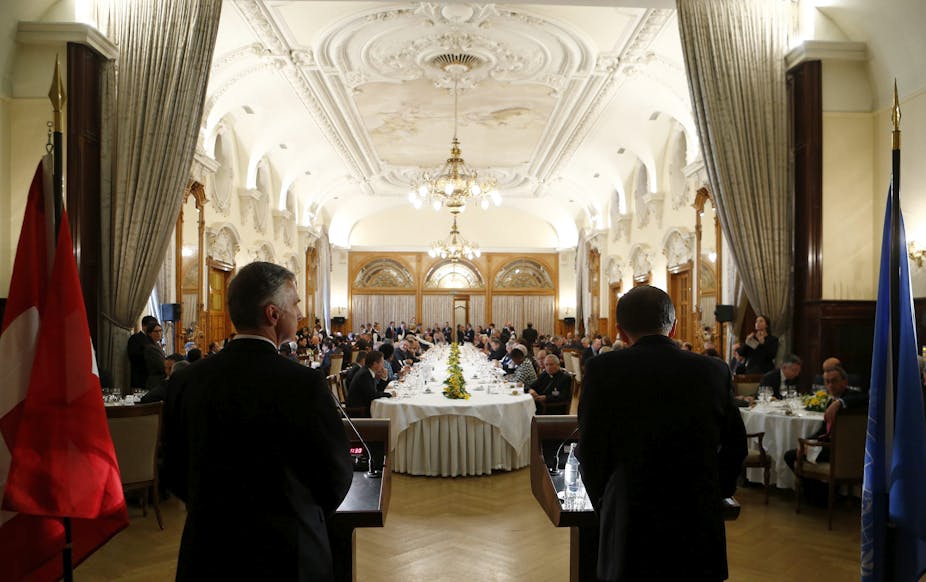The much-anticipated first round of the Geneva 2 Syrian peace talks wrapped up on Friday after ten days of tense discussions. The international community had hoped that the talks would pave the way for a peace deal and transitional government. In reality, the meeting did little more than illustrate the size of the chasm between the warring parties.
In the end, the negotiations about transitional arrangements for Syria never took place. And as the talks wrapped up, the Syrian Observatory for Human Rights bleakly announced that nearly 1900 people had been killed in Syria while the conference was under way.
The talks were fraught with difficulty from the outset. In the week before the meeting, the main opposition group attending, the Syrian National Coalition (SNC), pulled out twice. Iran was both invited and uninvited within a 24-hour period.
The first day of talks was then quickly overshadowed by the release of a 31-page report that showed that the torture of prisoners was taking place on an “industrial scale” at the hands of the Syrian government.
The report documented the findings of three international lawyers on 55,000 photos of the bodies of Syrian prisoners, representing the most definitive evidence yet that large-scale human rights abuses are taking place. This put a bitter twist on the talks from the outset.
Predictably, the main roadblock at the talks was whether Syrian president Bashar al-Assad would play a role in post-war Syria. This was no surprise as the government sees Assad as integral to Syria: the Assad family has ruled the country for 43 years and is very much part of the furniture. In contrast, the opposition has consistently said that Assad has no future in Syria.
The US backed the opposition’s position, with US Secretary of State John Kerry emphatically stating that:
You cannot save Syria with Bashar al-Assad in power.
Both sides of the conflict have been equally firm on this front. They showed no intention of backing down over the course of the talks. Given that this issue is currently the most important question for post-war Syria, it is unlikely that anything substantial can be agreed upon until this is resolved.
With this in mind, the UN Envoy at the talks, Lakhdar Brahimi, announced that he would first focus on small “confidence-building” measures before working towards the more-contentious issue of transition. However, the two sides were unable even to agree on minor issues such as prisoner exchanges and localised cease-fires.
Although Brahimi secured an early win with the government agreeing to allow aid into Homs, aid trucks had not been permitted entry by the time the talks finished.

The lack of progress was evident in each side’s parting remarks. On Friday, Syrian foreign minister Walid Moallem announced that:
I regret to tell you that we have not reached tangible results during this week. There is no moderate opposition in Syria, only terrorists.
Opposition spokesperson Louay Safi responded by accusing the regime of insincerity:
The regime clearly doesn’t want a political solution, doesn’t want to move a step forward to end the Syrian suffering. We will not be sitting here endlessly.
This divide is a major problem given that the SNC is one of the more moderate parts of the Syrian opposition. If the government and the SNC can’t reconcile their positions, there is little hope of a wider peace agreement with the more radical opposition groups on the ground.
As a result, the Geneva 2 talks were a major disappointment to observers who had hoped that – at a minimum – small-scale humanitarian agreements could be brokered to ease the strain on Syrian civilians. Given that fully stocked aid trucks remain stationed outside Homs, it could be argued that the talks failed on all fronts.
The next round of talks is scheduled for February 10. There is little reason to expect that these will bear more fruit. While the Syrian National Coalition has said that it will attend the next round, the government is yet to agree.
Even if the talks do go ahead, comments from Moallem may give an indication of the government’s attitude towards the next meeting:
Neither in this round nor in any in the future, the opposition will not get a single concession from us. They will not be able to achieve by political means what they failed to achieve with force.
This would suggest that neither side of the conflict is ready for peace talks, no matter how hard the international community pushes.

